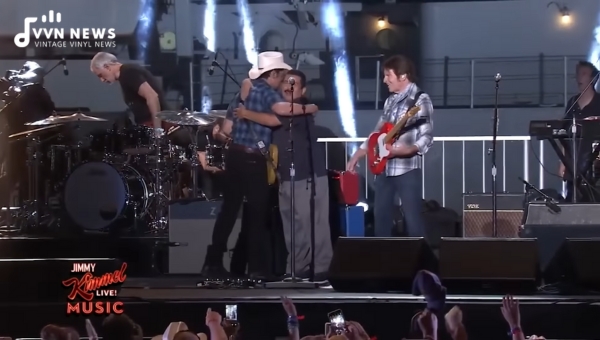When you think of the unique sounds that shaped the landscape of rock ‘n’ roll, the raspy, soulful voice and aura of John Fogerty inevitably come to mind.
Yet, in a bizarre twist that seems more fitting for a Kafka novel than the music industry, John Fogerty got sued for sounding like himself.
That’s right! The accusation boiled down to an artist being too similar to his sound – a perplexing idea that might make anyone do a double-take.
This infamous incident wasn’t merely about music rights or royalties; it was an issue that ultimately revolved around creative integrity and artistic identity.
To add more context to this intriguing tale, let’s delve into what exactly happened and how it altered the trajectory of Fogerty’s musical journey.
Who is John Fogerty?
Known as one of the most influential musicians in the rock ‘n’ roll genre, John Fogerty made his mark as a singer, songwriter, and guitarist.
Born on May 28, 1945, in Berkeley, California, he’s accented the world of music with his distinct raspy voice and authentic rock ‘n’ roll spirit.
Early Days
John achieved fame with his band, Creedence Clearwater Revival, back in the late 60s and early 70s.
This was where he established himself as a one-of-a-kind musician – writing, arranging, producing, and frequently leading vocals on hits such as “Have You Ever Seen The Rain”, “Bad Moon Rising”, and “Proud Mary”.
His songs formed an essential part of the soundtracks of that tumultuous era.
Solo Career
After leaving Creedence in late 1972 due to internal disputes and creative differences, Fogerty launched a solo career.
His most renowned solo hit is probably Centerfield – a cheerful tune dedicated to baseball that magnified Fogerty’s unmistakable sound.
Legacy
Fogerty’s contributions to rock haven’t gone unnoticed. He was inducted into the Rock & Roll Hall of Fame in 1993 – an honor recognizing his significance in music history.
His creative legacy serves as inspiration for countless artists who dare to possess their unique trademark sound.
Overview of the Lawsuit

In 1985, John Fogerty was named in a lawsuit by his former record label, Fantasy Records, and its owner, Saul Zaentz.
The gist of the lawsuit was perplexing, to say the least. Fogerty found himself sued for sounding too similar to himself, specifically for a perceived similarity between his solo track “The Old Man Down the Road” and “Run Through the Jungle,” a song from his days as a part of Creedence Clearwater Revival (CCR).
Why Was John Fogerty Sued for Sounding Like Himself?
It seems like an insane basis for legal action, right? That’s because that sort of accusation is almost unheard of in the world of music production.
Indeed, it was more than just about his distinctive sound; it was about ownership rights.
Despite being the writer and singer of CCR’s hits, Fogerty had lost copyrights to those songs following bitter disputes with his former label.
Upon releasing “The Old Man Down The Road” as part of his successful comeback in 1985 under Warner Bros Records, Zaentz listened keenly – perhaps too keenly.
He accused Fogerty of plagiarizing himself by rewriting CCR classics to create new music.
The Plaintiff’s Claims and Arguments
Zaentz alleged that “The Old Man Down the Road” bore an uncanny musical similarity to “Run Through The Jungle“, infringing on Fantasy Records’ copyrights.
This meant Fogerty faced accusations of self-plagiarism—a concept that boggles most musicians’ minds even today.
Zaentz claimed that Fogerty copied substantial parts from one song he wrote and used them in another he also wrote—an irritating and bewildering argument if considered in light of how copyright law generally applies to music authorship.
Also Read: Autechre’s Flutter Vs The Criminal Justice [Music Vs Politics]
Understanding John Fogerty’s Unique Sound
John Fogerty’s sound is an intrinsic part of the rich tapestry of American music.
His distinctive sonic signature, a blend of swamp rock meets country and blues, laid down a new path within the rock ‘n’ roll world.
The Distinctive Sound of John Fogerty’s Music
Fogerty’s unique sound comes from a blend of Southern influences mixed with an evocative and powerful voice that could conjure varied moods.
His guitar playing has its roots firmly planted in the blues, highlighted by his superb finger-picking prowess.
The raw, gritty tone of his voice carried stories of blue-collar life with an authenticity that resonated deeply with listeners across all walks of life.
His most remarkable attribute may well be his songwriting skill. Coupling thought-provoking social commentary with catchy hooks, Fogerty was able to musically articulate the era’s spirit in a manner that still reverberates today.
Influence and Legacy of John Fogerty
Fogerty’s music made an indelible impact on both his contemporaries and successive generations.
Whether it was Bruce Springsteen citing him as an influence or Tom Petty covering his songs, the respect for Fogerty extends far and wide across the musicians’ fraternity.
Beyond individual artists, his influence can also be seen in entire sub-genres such as Americana and roots rock, where echoes of Fogerty’s distinctive sound can easily be identified.
Moreover, his lasting legacy is secured through those who have emulated him and countless fans worldwide who continue to find solace in his anthemic and heartfelt songs.
The Impact on the Music Industry
Fogerty’s sound revolutionized the American music scene primarily by connecting diverse genres into a coherent ensemble that appealed to a vast spectrum of music lovers.
The industry took note; it saw how lyrics drawn from everyday life fused with unique sonic textures could create a sound both widely appealing and deeply personal.
His work with Creedence Clearwater Revival, and later as a solo artist, introduced a unique blend of blue-collar storytelling and infectious hooks that left an enduring mark on the industry.
Record labels began to appreciate authenticity and rootsy appeal in an era increasingly defined by studio refinement, and for this dramatic shift, Fogerty takes a lion’s share of the credit.
Ultimately, his influence underlined the value of authenticity over gimmickry – a value upheld by artists and appreciated by audiences even today.
Legal Precedents in Music Copyright Cases

To fully comprehend the intensity of the lawsuit that John Fogerty faced, it’s crucial to understand a bit about copyright infringement within the music industry.
Copyright Infringement – A Brief Overview
Copyright law is an important part of the creative industries, including music. It aims to protect original works from unauthorized use by competitors or others seeking to benefit from someone else’s creativity.
In principle, copyright infringement occurs when protected aspects of a creative work are used without permission.
In the music industry, copyright infringement can take numerous forms; for example, unlawful sampling where a portion of one song is used in another without proper licensing or credit, or straight-out plagiarism where an artist uses another musician’s work wholesale and claims it as their own.
Past Cases of Artists Being Sued for Sounding Like Themselves
Although many artists have been sued due to alleged imitation of others’ sounds and styles, examples of instances where artists were sued for sounding like themselves are scarce.
The phenomenon emphasizes the uniqueness of Fogerty’s case; few musicians have faced similar charges relating to self-replication.
Notable Legal Decisions Influencing Copyright Claims in Music
A handful of landmark decisions have set significant precedents over time within copyright law applicable to music. Here are a few prominent ones:
- Bright Tunes v George Harrison: This case clarified that even unconscious copying falls under copyright infringement.
- Blurred Lines Case (The Gaye Family v Thicke & Pharrell Williams): The judgment stated that even elements like ‘vibe’ and ‘feel’ of a song could be copyrighted.
- The “Stairway To Heaven” Case (Michael Skidmore v Led Zeppelin): This ruling stated not all similarities between two songs necessarily imply copyright infringement.
Each case has helped shape legal boundaries regarding what can be considered originality within the music industry.
These precedents inevitably affected the judgment in Fogerty’s case, which remains an engrossing chapter in music history due to its peculiarity and fascinating intersection of law, creativity, and personal musical style.
Analyzing the Lawsuit Against John Fogerty
The case against Fogerty was brought on by Fantasy Records, owned by Saul Zaentz.
This record label company had the rights to Creedence Clearwater Revival’s (CCR) music, a band that had seen massive success in the late 60s to early 70s, with Fogerty as their leading member.
Examination of the Plaintiff’s Evidence and Arguments
Fantasy Records put forth their claim, alleging that John Fogerty’s 1985 solo track “The Old Man Down The Road” sounded suspiciously like a Creedence Clearwater Revival song “Run Through The Jungle”, penned by Fogerty himself in 1970.
They claimed that he ripped off his song to create new music, thus infringing copyright laws.
What seemed unique about this case was the argument made by Fantasy Records—they accused Fogerty of plagiarizing himself!
It wasn’t uncommon for artists to be sued for sounding too similar to other artists.
But being sued for sounding like one’s own self took a precedent-setting twist in the realm of music copyright infringement.
Expert Opinions on the Alleged Similarities Between Fogerty’s Songs
Several industry experts were summoned during this lawsuit, each bringing their unique perspectives on this peculiar case.
Musicologists and specialists pored over every note, lyric, and melody of the two songs in question.
Opinions were divided—some indeed detected similarities between “The Old Man Down The Road” and “Run Through The Jungle”, primarily because of similar guitar riffs central to both tunes.
However, others opined that these weren’t enough to state an outright copyright violation since artists often have certain styles and characteristics that define their craft.
Counterarguments Presented By John Fogerty’s Legal Defense Team
Fogerty’s defense team built their counterargument around his inalienable right as an artist to employ recurring motifs and themes.
They asserted that an artist’s work naturally evolves, drawing upon previous creations—it’s not plagiarism but rather a reflection of growth and personal style.
It was argued that Fogerty was being put on trial for having a consistent signature sound across different works of his creation.
His lawyers posited that such a claim in this context can be viewed as dangerous, threatening the creative freedoms of artists by creating a chilling effect.
This lawsuit raised intriguing questions about copyright infringement, artistic expression, and the very essence of an artist’s creative rights.
The Implications for Artists’ Creativity and Originality

Of course, lawsuits of this nature cannot fail to send shock waves around the artist community.
The question that stands tall in the minds of many is: Does this lawsuit stifle artistic expression?
This may seem more like a theoretical issue than a practical one. However, it has deep-seated implications for the music industry at large.
When an artist like John Fogerty is sued over his stylistic choices, it begs the question of how safeguarded artistic creativity is within the legal framework.
When an artist’s unique sound —which is intrinsically tied to their identity— can be grounds for a lawsuit, genuine questions about creative freedom start to surface.
Chilling Effect on Creative Expression
The consequences for other musicians and their unique sounds could be profound, particularly if they’ve produced work in similar stylistic terrain.
The very essence of creating music involves an exploration of signature sounds that identify musicians and set them apart from others.
It shakes up the very foundation of musical creativity if sounding too ‘similar’ —even if the similarity is to one’s past work— can become a copyright issue.
In Fearon’s words – “Just because you become famous playing your younger self, that doesn’t mean every song you sing should be stuck in time.”
This might make musicians more cautious about experimenting with unique rhythms or melody lines that could echo their older works, thus potentially sterilizing their creative process.
Impact on Future Artists
The wider effect of such cases could significantly affect future artists’ willingness to take risks musically.
Emerging musicians who look up to seminal figures like Fogerty may become petrified at the thought of litigation over their creative interpretation.
They may feel compelled to refrain from any musical exploration that flirts with echoing their musical influences, hindering progress in creating groundbreaking musical content.
In conjunction with this, there lies a danger in misconstruing influence—and the reverberation of one’s sound—as substantive replication.
This is a fine line that the industry treads upon, risking the potential derailment of the organic evolution of music that often results from taking such risks.
The issue reiterates how much the law struggles to compute artistic evolution and creativity.
The unique challenge posed by copyright law in the context of creativity underscores how multidimensional and nuanced this terrain can be.
All in all, while legal battles over copyright are hardly a novelty in the world of music, this lawsuit has opened up broader questions about musical originality, creative ownership, and structural power dynamics in the industry.
It is an unusual tale that has certainly left its mark on how we perceive creativity in music.
Also Read: Best Violinists Of All Time [The Maestros Who Made History]
The Outcome of the Lawsuit
In one of the most iconic lawsuits in rock ‘n’ roll history, the judgment remarkably fell in favor of John Fogerty.
In an almost poetic form of justice, Fogerty emerged victorious after a jury dismissed all claims presented against him within a mere two hours of deliberation.
The Battle Ends: Fogerty Triumphs
The jury found that The Old Man Down the Road wasn’t substantially similar to Run Through the Jungle, and ultimately, that John Fogerty did not plagiarize himself.
It was proven beyond reasonable doubt that Fogerty had not violated any copyright laws.
Ironically enough, not only did Fogerty win this case, but he also championed another major victory later on when he sued his former record company for attorney’s fees.
This case went all the way up to the Supreme Court and ended up setting a significant precedent for future cases about copyright infringement.
Ramifications for Artists
Fogerty’s ultimate victory set a significant precedent, promoting protection over an artist’s creative expression.
This judgment laid down an important message – an artist cannot copyright a style or “sound”. Artists reusing stylistic elements would not constitute self-plagiarism.
As a result of this landmark decision, the music industry experienced something akin to positive disruption; this ruling encouraged creative risk-taking among artists who could now opt to revisit and refine their unique sounds without fear of litigation.
For instance, George Harrison’s estate won against infringement allegations over similarities between his hit song “My Sweet Lord” and “He’s So Fine” by The Chiffons after successfully citing the Fogerty precedent – illustrating its ongoing value and influence within legal disputes in music copyright.
While some record companies may still use scare tactics and threats of lawsuits to control their artists’ creative liberties – as seen with Fantasia issuing a public apology for her song sounding like one by Melba Moore – many are deterred by Fogerty’s legal triumph, understanding that an attempt to sue over a stylistic imitation is likely to fail.
The outcome of this legal battle served not only as validation for John Fogerty but also as a beacon of hope for countless musicians around the world seeking to preserve their creative rights against overpowering record labels.
It championed the fact that an artist’s identity and sound are precisely what makes them unique, and therefore – simply put – unrepeatable and inimitable.
The Aftermath and Public Reaction

Following the verdict, the public sentiment was a mixed bag of amazement, disbelief, and somewhat relief amongst those in the music community.
As surreal as it seemed, John Fogerty being sued for sounding like himself had surprisingly opened up an unlikely Pandora’s box about creativity, originality, and how far copyright claims could stretch into an artist’s sound.
Reactions from Fans, Music Critics, and Fellow Artists
Fans were naturally in an uproar about what many perceived as a farcical trial. The ludicrous idea of a musician getting legally entangled for retaining his signature style was bewildering to them.
Music critics generally agreed that the lawsuit was just another example of how contentious copyright infringement can become when intertwined with sonic likeness.
Fellow artists also weighed in on the matter. Many saw this as an alarming precedent that risks stifling musical innovation and hence showed steadfast solidarity with Fogerty.
It suddenly became apparent to many performing artists that they were vulnerable to such lawsuits if their work resembled their previous songs too closely.
Impact on John Fogerty’s career after the lawsuit
Amazingly, Fogerty emerged from this legal wrangle even more resilient than before without letting it hamper his creative spirit.
If anything, his career trajectory soared upwards after this infamous incident catapulted him back into the public eye.
His subsequent work continued to carry his distinctive sound and energy without any noticeable dip in quality or distinctiveness.
That said, there’s no denying that his experience served as a stark reminder of just how complicated music rights can be – especially when you’re being accused of plagiarizing yourself!
His victory stands testament to maintaining artistic integrity even when faced with such bizarre accusations.
Lessons learned from this legal battle
This unusual case has highlighted certain key takeaways – not just for musicians but for anyone involved in creative production where copyright comes into play:
- Artists must be aware of their rights and understand the implications of contract agreements.
- The lawsuit underscored the necessity for clear parameters when it comes to sonic likeness and copyright. It reminded artists of the importance of retaining legal counsel when dealing with complex music rights.
- And finally, it demonstrated that an artist’s unique style – their creative signature – should remain inviolate and cannot be subject to legal scrutiny.
John Fogerty’s ordeal serves as a cautionary tale that will continue to astound, confound, and educate artists on how bizarre yet pivotal copyright law can become in shaping an artist’s career.
FAQs About John Fogerty
Who is John Fogerty?
John Fogerty is an acclaimed American rock singer, songwriter, and guitarist, best known as the lead vocalist for the band Creedence Clearwater Revival.
Why was John Fogerty sued for sounding like himself?
In a legal quirk, music label Fantasy Records sued Fogerty claiming that his solo track “The Old Man Down the Road” was too similar to CCR’s “Run Through the Jungle”, which they owned rights to.
Has any other musician faced lawsuits similar to those of John Fogerty?
There’ve been several high-profile cases involving artists like Led Zeppelin and Pharrell Williams. However, being sued for sounding too much like oneself remains unique to Fogerty’s case.
What are some of John Fogerty’s most famous songs?
Aside from “The Old Man Down the Road” and “Run Through the Jungle”, other popular tracks include “Bad Moon Rising”, “Fortunate Son”, and “Have You Ever Seen The Rain”.
How did the lawsuit impact John Fogerty’s career?
Despite the lawsuit creating a significant barrier in his career at that time, it didn’t hamper his legacy. He continues to be one of rock music’s respected figures.
Conclusion
At first glance, the lawsuit against John Fogerty appeared absurd. Yet it served as a potent reminder about the complexities of artistic authenticity and copyright claims in the music industry.
When examined more closely, it’s scarily conceivable to imagine an artist being sued for playing consciously or subconsciously to their unique style.
Thankfully, creative ingenuity prevailed, shaping the future trajectory of legal issues in music copyrights.
Ultimately, this particular tale not only underscores Fogerty’s distinctive musical genius but also highlights an unforgettable moment in the annals of rock ‘n’ roll history.








